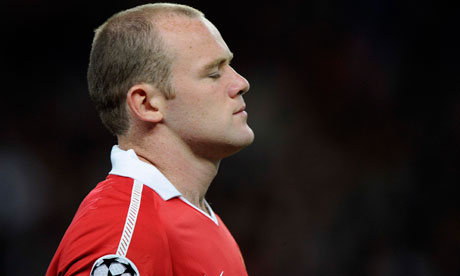
Pug-faced footballers interest me about as much as conveyancing solicitors, who have had far more impact on my life. There was even a brief period at school when I thought this Man U everyone else was talking about was actually a Burmese military dictator. So if you want an in-depth discussion about whether Rooney just wanted to play alongside his mate Carlos Tevez, then my advice is to move on to the sports section, whose writers will take good care of you.
What interests me is how a striker who has only scored one goal this season, who had a terrible World Cup, who is in what's widely described as the worst form of his career, can command a weekly wage reportedly between £200,000 and £250,000. And for that, economists have some answers. Even better, whether left or right, Chicago or Cornell, their arguments yield some common suggestions for what can be done about it. Best of all, in these austere times, those suggestions involve imposing higher taxes on the people who earn such huge amounts. We can even call it a Rooney tax, and demand that George Osborne introduces one in his next Budget.
The first thing economists suggest about the explosion in players' wages is that there is little incentive for the clubs to stop paying out so much. Put bluntly, clubs pay top dollar for top talent because it keeps them at the top of the table. Studying the performance of 40 English clubs over two decades, the sports economist Stefan Szymanski found that their wage bills accounted for 92% of the variation in their league positions. In Italy, the link was a tad stronger at 93%.
Set aside precise calculations of value for money, put out of your mind the (very real) prospect that a manager might overpay for a forward who then spends most of his time on the bench or in physio, and turn a blind eye to the recklessness that some clubs have shown in running their finances. The implication of this finding is clear: a club that wants to go places is under a huge amount of pressure to spend a lot on players. The same goes for directors hiring staff at investment banks and producers casting actors for a film.
I'm lumping Cristiano Ronaldo together with Bob Diamond and Robert Pattinson for a reason: they're all examples of what economists sometimes refer to as superstars. And the second thing economics teaches us about superstar pay is that it is fruitless to work out whether Yaya Touré really is that much better than other midfielders. In The Economics of Superstars, published in 1981, the Chicago academic Sherwin Rosen argued that those generally agreed to be the best in their field generally scoop the vast majority of the rewards.
"If a surgeon is 10% more successful in saving lives than his fellows, most people would be willing to pay more than a 10% premium for his services," Rosen wrote.
The other point Rosen made was that when it became possible for more people to witness a brilliant performance, then the top performer would make even more money. And if you think about it, audiences from Nepal to Nebraska are better able than ever before to witness the same performances – through satellite TV, DVDs and iTunes.
Rosen's work on superstars is probably the most widely quoted in the entire field – proof perhaps of his own theory. As a description of a process it is both ingenious and elegant. But it is less good for football and other team pursuits (banking, films) than solitary sportsmen and novelists. Still, here is the main point to take away from his argument: a significant sum of the wages paid to superstars is not merited solely by their talent, but by the simple fact that they are in pole position in their field. It is the rank that is being rewarded, not the person.
Put that argument together with Moshe Adler's work on superstars. Adler believes that people are naturally attracted to what other people value – it gives them something to talk to others about, and a common culture. So it is that hordes of people will read the latest Dan Brown or teenage girls will all get into the Saturdays.
Ranking, the spread of technology, and the development of a common culture: superstars benefit from all of these and yet have little to do with any of them. There is therefore no reason why film stars, footballers or financiers should hold on to so much of their earnings.
The lesson from Rooney's negotiations, according to my economics monographs, is that we would be quite entitled to levy a higher rate of tax – call it the Rooney rate – on superstars. It's hard to see what harm it would do. RPattz is unlikely to throw in his job to work at Tesco. Tevez is unlikely to retrain as a corporate lawyer. As for Rooney, it might even encourage him to spend more nights indoors with Coleen.


0 comments:
Post a Comment